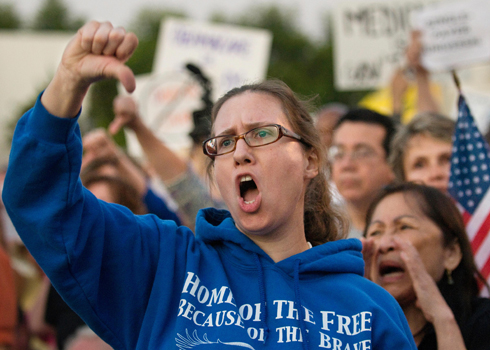Members of Congress are back in their districts, attending town hall events, explaining to their constituents why, exactly, they want to make such major changes to the health care system.
If that sounds familiar, you might be wondering if we’re in for August 2009 redux. That was when conservatives and tea party activists caused mayhem at Democratic town hall events and sowed doubt in the minds of members and the media about whether the push for health care reform was really viable. Now, Republicans have their sites set on Medicare and Medicaid, and just voted, almost to a person, to basically zap both programs.
So are we in for a repeat?
Don’t bet on it. So far this week, we’ve seen a handful of video clips showing Republicans being interrogated by constituents — experiencing mild discomfort, but nothing like the genuinely frightening scenes two years ago, when large groups of coordinated, angry activists forced members to call off and cancel events. This is frustrating for progressives — but don’t be too quick to pin the blame entirely on Democratic and liberal ineptitude. It turns out there are plenty of non-obvious differences between then and now.
“I don’t think it’s possible to do that over again,” said Justin Ruben, executive director of MoveOn. “It’s like SwiftBoats in 2004. Interesting things happened in August, but it’s hard to repeat.”
MoveOn is mobilizing and prepping its members for town hall events in their districts, and is responsible for some of the disruptions — such as they are — that we’ve seen so far.
But things have changed since 2009. Those town hall disruptions convinced members of both parties to lower their profiles. The shooting of Rep. Gabrielle Giffords (D-AZ) reinforced that instinct. In 2009, town hall events were publicized and scheduled well in advance. That’s not true anymore.
On top of that, progressive, Democratic, and union groups across the country aren’t fighting off one threat to their interests — they’re swamped by state-level fights over collective bargaining, public pensions, voting rights, and other conservative onslaughts.
Both AFL-CIO and SEIU are educating their members about the GOP budget, and encouraging them to make their members of Congress answer for their votes. They’re organizing “Don’t Make Us Work ‘Til We Die” events. But there’s no organizing specifically around packing and disrupting town halls.
“It’s not so much about making public noise, but really making sure that union members and their families understand the devastating impact this would have on union members and working people,” said AFL spokesperson Alison Omens.
Beyond that there are just some fundamental differences between the health care reform push two years ago, and the budget vote last week. By August ’09, health care reform had been at the center of public debate for months, and had been vilified ad nauseum by Fox News, right-wing talk radio and other conservative media. House Republicans introduced their budget two weeks before voting for it, and skipped town before the gravity of it had a chance to sink in outside of Washington.
Despite these challenges, it’s certainly true that there could have been more of a ruckus. That’s a missed opportunity for progressives and for Democratic infrastructure. But numerous progressive, union and Democratic party sources suggest a few caveats. They say the coming week, but, more to the point, future recesses, will provide greater opportunities. And they note that the Democratic Party is only now coming around, after spending the first part of the year buying into conservative frames on spending and other issues. When the opposition party isn’t providing a stark contrast, and clearly explaining the threats, it’s much harder for advocates to get liberal voters, union members, and retirees fired up for direct action campaigns.
“Democrats in Washington from the President on down were consistently failing to challenge Republicans,” Ruben said. “I think that’s just starting to change.”
But, he notes, they’ll have to play catchup. “Democrats ought to be in Paul Ryan’s districts doing events — [they] ought to be in the districts of every vulnerable Republican holding events with seniors telling them that Medicare will disappear,” Ruben said. “I think they haven’t yet taken advantage of this period — I hope they will.”










